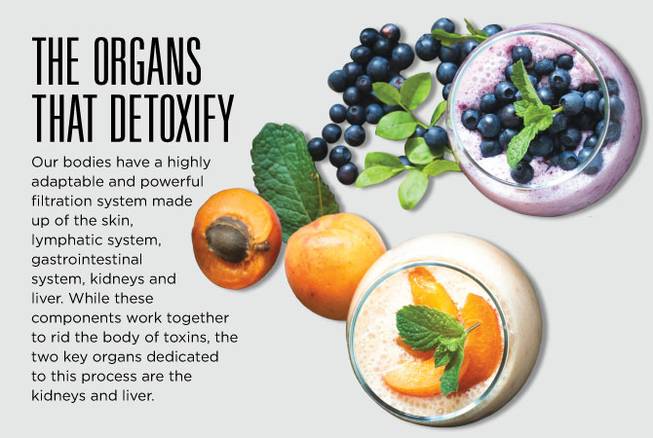
Monday, Jan. 16, 2017 | 2 a.m.
“Detoxing” and “cleansing” have been popular marketing terms in recent years, but how legitimate are associated claims?
Well, they are controversial, and like many other health and wellness fads, there are two sides of the coin.
Bryn Rodriguez, MD, internal medicine physician at Southern Hills Hospital and Medical Center, explains that for most healthy people, the body’s natural filtration systems are able to remove toxins efficiently and don’t require additional “detox” support. However, that doesn’t mean we need to automatically dismiss these trends.
“The good part of some of the marketed detox diets is that they are usually associated with a clean and healthy diet and an increase of fluids,” Rodriguez said.
As we continue to wade through our New Year’s resolutions and set goals for this year, here’s a look at how our bodies naturally detoxify and what to keep in mind if you’re considering a “detox.”
What is detox, and what are we “detoxifying” from?
Medically, detox refers solely to treatments administered to patients who have high levels of drugs, alcohol or other poisons in their system. In this instance, the patient may need medical treatment to help expel such chemicals and to cope with withdrawal symptoms.
However, the term detox has now been commandeered by many health-oriented brands and initiatives to refer to an array of products promising to help purge the body of everyday, nondescript “toxins.” But what are these toxins, and should we be worried about them?
“The most common toxins to the body are things we ingest, such as alcohol and food that are broken down internally. There also may be some exposure to other types of environmental toxins, such as lead or arsenic, depending on some vocational and lifestyle factors. These can be dangerous and may require medical treatment,” Rodriguez said.
The Centers for Disease Control and Prevention releases an annual report on human exposure to different toxins and chemicals. This report includes environmental toxins, as well as chemicals that are added to food and other consumer products. The body may not be able to properly process and excrete some of these chemicals, which can then end up being stored in fat cells, potentially causing problems if they continue to accumulate.
“The body also may create granulomas — a mass of tissue created in response to infection, inflammation or foreign substances — which is the body’s way of walling off things that it cannot excrete, to prevent damage to the rest of the body,” Rodriguez said.
Fortunately, most people can limit their exposure to such toxins by avoiding known, unhealthy chemicals, including asbestos, mercury, BPA plastics, and those found in cigarettes and processed foods.
The organs that detoxify
Our bodies have a highly adaptable and powerful filtration system made up of the skin, lymphatic system, gastrointestinal system, kidneys and liver.
While these components work together to rid the body of toxins, the two key organs dedicated to this process are the kidneys and liver. “The liver is responsible for eliminating toxins through the stool and bile, and the kidneys are responsible for eliminating toxins through urine,” Rodriguez said.
Together, the kidneys and liver filter the blood, separate nutrients from chemical waste and excrete any unneeded or damaging toxins from the system. While these organs are built to withstand an incredible amount of abuse, they also can become overburdened, which can prevent them from functioning optimally and/or cause disease.
To prevent overburdening these organs, Rodriguez recommended drinking plenty of water, eating small, frequent meals throughout the day, and limiting your intake of bad carbohydrates, fatty meats, alcohol and drugs.
To cleanse, or not to cleanse?
Many cleanses and detox diets eliminate processed foods, alcohol, animal-based proteins (particularly red meat), refined sugars and carbohydrates, while promoting a high intake of vegetables, fruits, high-fiber grains and fluids — all of which are good for the body.
There is little evidence to suggest that any of this will actually help rid your body of toxins, but many people report feeling healthier and more energized after a cleanse diet. This is likely because they’re eating more nutritiously and not overburdening their body with unhealthy food and drinks.
For most healthy people, a moderate detox diet that simply encourages clean eating and limiting toxin exposure will yield positive results. While such diets won’t work to purge toxin buildup, or do anything your body doesn’t already do on its own, they may act as something like a lifestyle detox, in that they can help some people change unhealthy dietary habits and adopt better ones.
However, other detox plans and products may promote fasting, supplements, colonics or other treatments that can be dangerous or, at the very least, a waste of time and money. If you’re considering a more aggressive option that recommends any of these things, consult with your physician first.

Join the Discussion:
Check this out for a full explanation of our conversion to the LiveFyre commenting system and instructions on how to sign up for an account.
Full comments policy